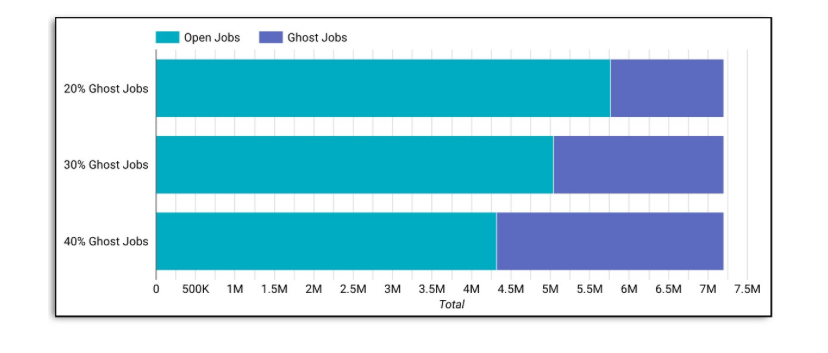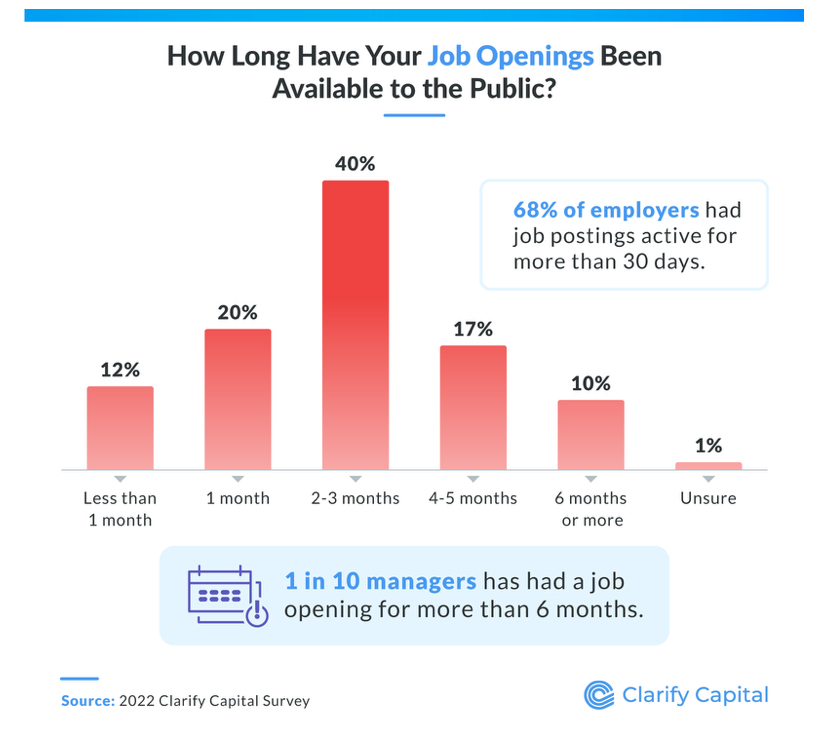Stop wasting time on adverts that lead nowhere and learn how to spot ghost job postings UK before applying so you can apply smarter, not harder.
You don’t have to fall victim when you can start with the company domain, posting date, and a named contact. Then cross-check listings on verified boards and scan LinkedIn for recent hires.
Want to know the best part? A quick review search and a firm “no” to fee requests will save hours. Use job board verification UK tools and simple red-flag checks to dodge fake roles.
Let’s go through the step-by-step guide on how to spot ghosts and how to land the real ones, together.
What Are Ghost Job Postings?

Ghost job postings are adverts that look real but lead nowhere. They waste your time and can expose you to scams. Employers, agencies or bots sometimes post these ads to test interest, gather CVs, or boost metrics.
According to LinkedIn report about 20% – 40% of 7.2 million job openings could be ghost job.
Ghost ads turn up on major job boards and company pages. Learn quick checks now so you don’t apply blindly or share data. You’ll find simple steps that save you hours and keep you safe while you job hunt.
Definition and Why They Exist in the UK Job Market
A ghost job posting is a vacancy advertisement that is either not genuine or will not be filled, but its purpose varies. Sometimes companies post to measure candidate interest, and sometimes recruiters list roles to build talent pools.
Some organisations repost long-running vacancies to keep listings visible. Others may use ads to test salary ranges or market demand. In the UK, this practice can confuse job seekers and mask real hiring needs.
When you know how to identify fake job ads UK, you reduce the risk of being a victim. Quick checks save time. Check dates, contact emails, and company pages. Ask direct questions in interviews. Keep copies of ads and dates. Then move on if the answers are vague.
Common Reasons Employers Post Jobs They Don’t Intend to Fill
Companies and recruiters post jobs they do not plan to fill for many reasons. Some want a larger talent pool for future hiring. Some list roles to keep metrics high or satisfy internal reporting.
Other times, ads remain active due to poor admin or forgotten requisitions. Hiring freezes or budget cuts can leave postings live. Some firms test salary levels by seeing applicant responses.
As a job seeker in a bid to Identify Your Career Goals and find a Fulfilling Path, you should know these motives so you can decide whether to apply. You’ll be getting tips to spot signs and save your effort.
Use practical checks, document timelines, and follow up with HR when in doubt and continue.
See Also:
- How to Deal with Rejection and Stay Resilient in Your Job Search
- How To Use Social Media For Your Job Search
Red Flags That Indicate a Job Posting Might Be Fake or Inactive
Spotting a fake or inactive ad starts with red flags you can check fast. Look for missing details, odd email addresses, unrealistic pay, and vague duties. Reposted ads with the exact text over months are suspicious.
Also watch for requests for money, early demands for bank details, or rushed offers. Suppose you see multiple signs, pause and research. There are quick checks that protect your time and data when job hunting in the UK and save you wasted effort daily.
Vague Job Descriptions and Missing Key Details
When trying to find out how to spot ghost job postings UK before applying, vague job adverts are a significant warning sign. If a listing lacks a clear job title, duties, or required skills, be wary.
It may be a copy-paste or a placeholder; missing salary ranges, location details, or company info are red flags.
Some scammers use vague wording to attract many applicants quickly, and with the hope of getting hired faster, you could fall victim. When descriptions sound too good or promise high pay for little work, pause. Cross-check the role against similar postings on other sites.
Ask for a detailed job specification and a named contact, and check the company’s careers page for the same role. If the ad asks for fees or bank checks, it’s likely a scam. That is how to identify fake job ads UK.
Trust concrete roles over vague promises and keep short notes. Reach out to current employees on LinkedIn and ask polite questions. If responses are slow, treat the listing as inactive and focus on better options today.
Job Ads Reposted Frequently Without Updates

Repeated reposts of the same job advert are a strong signal that a role may be inactive or a placeholder. Recruiters sometimes repost without changes to maintain visibility or to meet metrics. This is how to spot ghost job postings UK before applying.
A number of employer leave their job opening ads for about 30days, but frequent reposting with no updates can mean the organisation may not have intended to hire right away. When you see identical text across weeks or months, check the posting dates and the company’s careers page for a history.
Contact HR or the listed recruiter and ask if the role is still open and when interviews will take place. If you get vague timelines or no reply, treat the ad cautiously. Save copies of each repost and keep a log of dates. You will spot repeat patterns and avoid wasting applications.
How to Research a Job Posting Before You Apply
Researching a listing before you apply saves time and prevents risk. Start with simple checks: company site, recruiter details, and posting dates. Compare the ad to other listings for the same job.
It is easy to get tricked while looking for jobs in the UK, especially Jobs in London with Visa Sponsorship, so be careful. Look for official contact names and verified emails. Use quick searches to confirm the company and role. Take notes and set a short deadline for replies.
This approach helps you avoid bogus or inactive adverts, keeps your search focused, and protects your data while you apply.
Checking the Company’s Official Careers Page
Always check the company’s official careers page before you apply. If the role appears there with a date and a job ID, that is a strong sign the job is real. Some firms only list roles on their site and not on aggregators, so you should compare the ad text to the company posting.
When vacancies are plentiful or scarce, it changes how quickly hiring moves. For example, the ONS reported an estimated 831,000 vacancies in the UK for August to October 2024, which shows market scale and competition.
Use the careers page to find official contacts and application links.
If you can’t find the role on the company site, ask HR directly. If HR confirms the role is closed or was a test, proceed. Save screenshots and keep a log of replies. Follow up once and then move on.
Reviewing Recent Employee and Candidate Reviews
Reading recent employee reviews and candidate feedback provides valuable insights about hiring practices and culture.
Glassdoor, Indeed, and company review pages are the best places to Search For Jobs in the UK and check for interview notes and any mention of long-running adverts. When several people say roles remain open forever or hiring stalls, the listing may be inactive.
Look for patterns in reviews about slow processes, ghosted candidates, or odd interview requests. Reviews mentioning fees or bank transfers should be treated as suspect. Ask specific questions in your outreach and reference reviews.
If answers fail to address concerns, deprioritise the role and protect your data. Then move on to verified vacancies with confidence.
See Also:
Tools and Platforms That Help Detect Ghost Job Postings in the UK
Some tools and platforms help you spot fake or inactive job listings quickly. Use verified job boards and Top Websites for Job Search. You can go through company sites and official recruitment pages.
Browser search operators and LinkedIn let you check post history. Job board verification badges can show trusted listings. Use alerts for reposts and set filters to reduce noise. This is how to spot ghost job postings UK before applying.
Combine site tools with a simple checklist to weed out suspect ads before you spend time applying. This saves effort and reduces exposure to scam job postings.
Using Job Boards with Verified Listings
Choose job boards that verify employers and show trust badges. Verified listing features reduce fake ads. An Effective Guide to Finding Job Postings for Immigrants in the UK. Some sites remove suspicious adverts quickly and warn users, so use board tools to flag and report questionable posts.
Students and early career searchers are often targeted, with over 19,000 muling reports filed to Cifas in Jan–Jun 2024, showing scammers usually recruit via fake job ads aimed at students.
This means you might need to keep a list of trusted boards you use frequently. Check each board’s help pages to learn how they police scams and handle reports.
When a job board has employer verification, double-check the link points to a company domain. Avoid applying through third-party links that ask for payment. Use built-in report buttons to flag suspicious entries.
Wait for the board’s replies to your report, and note the response. Over time, prefer boards that act fast.
Leveraging LinkedIn and Professional Networks
LinkedIn and networks are powerful for vetting roles. Search the company page and see recent hires. Check profiles of people saying they work in the posted role and look at their timelines.
Message current employees politely with specific, short questions about whether the role exists. Use alumni groups, professional forums, or sector communities to verify openings.
A quick LinkedIn check can reveal if a job is new, long-running, or likely a repeat placeholder. Keep messages concise and professional, even when you find a match, ask about hiring timelines and the recruitment contact.
Avoid long chat threads; use short, clear questions. Record replies to track responsiveness. When many people say the ad is not active, prioritise other roles. Networking often beats blind applications today.
Read Also:
- How to Transition to a New Industry in the UK
- What Are The Best Job Search Websites In The UK for 2025?
Protecting Your Time and Effort in the Job Search

Protect your time by using a focused job search plan. Set realistic daily goals, apply to roles that match your skills, and pause on suspect ads. Use templates to speed up applications, but customise each one.
Keep a tracking sheet for all applications and responses. Prioritise roles from verified employers and clear timelines. Block obvious scam emails and never pay to apply for a role. Stay organised. You can also use Applybuddy to find a Job.
Keeping a Targeted Job Application Strategy
Aim for a targeted application strategy that focuses on quality over quantity. Identify 3–5 roles per week that match your core skills and research them properly. Customise your CV and cover note for each employer with concrete examples.
Keep a short tracker with dates, job IDs, and contact names. This habit helps you see which listings are active and which are ghost adverts. Set follow-up reminders and only chase if you have a clear contact.
Use a simple spreadsheet and short notes to stay efficient and calm during long searches. This is an important tip on how to spot ghost job postings UK before applying.
Avoid blasting many generic applications to every posting. That wastes time and risks exposure to low-quality listings. Instead, spend extra time on roles from verified companies and roles you can evidence with examples.
Keep templates, but add specific achievements. Review replies and adjust your approach weekly.
Avoiding Over-Application to Dubious Listings
Over-applying wastes time and spreads your efforts thin. You might not know how to spot ghost job postings UK before applying. If you apply to many suspect adverts, you will get few quality responses.
Set rules: verify the employer, confirm a contact, and check the role on the company site. Use the tracker to mark dubious listings and note your reasons. When a listing shows multiple red flags, withdraw and do not follow up.
If a recruiter pressures you to apply quickly or pay fees, that is a scam indicator. Remember how to spot ghost job postings UK before applying starts with saying no to poor evidence.
Prioritise verified boards and direct company links. Teach yourself to recognise patterns where reposts repeat without progress. Share suspicious ads with peers through reporting tools and move on to better leads. In all this, do not give up. Stay Organised and Motivated During Your Job Search
See Also:
FAQs: How to Spot Ghost Job Postings UK Before Applying
- How common are ghost job postings in the UK?
Estimates vary, but ghost ads are standard on large boards. Use spotting fake job listings habits and follow the top job search tips UK to avoid wasting time. - Why do companies post jobs they don’t plan to fill?
Often, this is done to build talent pools or test markets. Watch for fake recruitment ads UK and inactive job ads UK that stay live without progress. - Can ghost job postings affect my job search success rate?
Yes, they lower response rates and waste hours. Learn how to avoid fake jobs and how to identify fake job ads UK to protect time and data. - How can I report a suspected fake job ad in the UK?
Report suspect adverts on the job board and to Action Fraud. Flag scam job postings UK when seen. Use site report tools and local police as needed.
